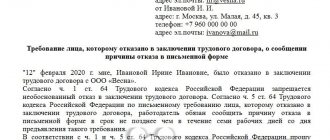Home » Inheritance » Refusal of inheritance
38
There are different reasons for refusing inheritance. These include exorbitant debts of the testator, burdensome assignments at the expense of the property received, the inability to take advantage of material benefits, or the desire to provide their share of the inheritance to loved ones. But whatever the motives, the consequences are the same - the irretrievably lost right to the property of the deceased without reservations or any conditions. Therefore, the heir should carefully analyze the situation and, with the constant desire to rid himself of the rights and obligations of the testator, familiarize himself with the rules of the refusal procedure.
Is it possible to refuse an inheritance without entering into it?
The possibility of refusing inheritance is established by Art. 1157 Civil Code of the Russian Federation. According to its instructions, the heir has the right to refuse to accept the property and accompanying obligations of the deceased, as well as to refuse to receive a testamentary refusal and an obligatory share of the inheritance. He can do this without even entering into an inheritance, as soon as he learns about the death of the testator.
It is impossible to refuse part of the inheritance except in cases where it is received on several grounds, for example, by law, by transmission, by will. Then the assignee can draw up a waiver of property laid down on one or more grounds.
Restrictions are also imposed on the ability of minors or incapacitated successors to dispose of inherited property - they can issue a waiver only after the approval of the guardianship and guardianship authorities.
How to file an application in favor of others
The application must be addressed to the notary who is involved in the matter. You should indicate information about the notary and his location in the upper right corner.
We recommend reading
Cancellation of a will
Also at the top it is written from when the application is submitted - the full name of the heir who wishes to make a refusal, his contact information for communication (address, telephone, e-mail, fax and other information).
The text of the application should indicate that the testator died on a certain day, which is confirmed by the death certificate. Next, the points and articles of legislative documents are indicated, on the basis of which the applicant is the heir of the deceased.
The following are articles of Civil Law on the basis of which the heir has the right to renounce his share. It should be indicated in whose favor the refusal was made, on the basis of which this person is the heir of the deceased.
The appendix contains the documents attached to the application, including a death certificate, documents on the relationship of the testator and heir, and a power of attorney if the application is submitted through a representative.
The application is signed, the signature must be notarized. The notary who received the application registers it in the prescribed manner.
Is it necessary to write a waiver of inheritance?
In current legislative provisions, writing a refusal is mentioned as the only way to voluntarily lose inheritance rights. But you can bypass the official renunciation procedure. The possibility of this lies in the following.
According to Art. 1152 of the Civil Code of the Russian Federation, inherited property must be accepted. And in Art. 1153 presents acceptable methods of accepting an inheritance (actual and notarial). Also in Art. 1154 of the Civil Code contains instructions regarding the time frame within which the heir can declare his rights. This is part of the mandatory conditions of succession, and failure to comply with them entails the loss of rights to receive the testator’s property and their transfer to other heirs (the next in line according to the law, designated in the will).
Based on what was written above, we can conclude that a citizen’s disinterest in the inheritance is a direct basis for ignoring his legal rights and transferring the property of the deceased to other claimants. Therefore, in essence, to commit a refusal it is enough not to enter into inheritance. At the same time, it is important for the refuser to know what he should not do.
To carry out an actual refusal, the heir cannot:
- Submit an application to the notary to accept the inheritance.
- Receive cash payments due to the testator.
- Pay off debts of the deceased.
- Use inherited property, renovate it, pay bills, appoint an intermediary to manage it.
- Implement any measures to protect objects of inheritance.
In other words, a complete lack of interest in obtaining inheritance rights and obligations within the period established by law is tantamount to renunciation of them.
An unofficial renunciation is the most convenient option for an uninterested heir if he does not plan to renounce in favor of another person or has not committed actions characteristic of entering into an inheritance.
Consequences
When relinquishing the property of the deceased, the heir must be aware of the irreversibility of the consequences of this procedure - according to paragraph 3 of Art. 1157 of the Civil Code of the Russian Federation, refusal of inheritance cannot be taken back. The implementation of the abdication procedure entails the annulment of all rights regarding the property of a particular testator and their transfer:
- to the successor designated in the will;
- to the remaining designated heirs, if the testator left them all his property;
- the person to whom the refusalr transferred his inheritance rights;
- successor by law, unless other heirs are specified in the will.
In exceptional cases, the refusal may be deprived of legal force in court, but the likelihood of success is not so high and depends on the weight of the applicant’s arguments and the irrefutability of the evidence he provides.
Is it possible to refuse an inheritance before death during the life of the testator?
It is impossible to refuse succession during the life of the testator, since any actions regarding his property are possible only after the death of the testator or he is declared dead through the court. Before this, the subject of the refusal (inheritance law) essentially does not exist.
The future objector can communicate his intentions to the owner of the inherited property in order to warn him. Perhaps the testator will decide to draw up a will in which he will indicate other successors or deprive the rights to the inheritance of someone who does not want to accept them. But such a statement on the part of the objector has no legal force and does not in itself entail legal consequences.
How to renounce a will while the testator is alive
Refusal to accept property under a will is possible after the death of the testator. Absentee waiver of property rights or a document that vests them in heirs is not provided.
But if the heir knows about the existence of a will, then he can agree with the testator to transfer the property or part of it to another person. You can also nominate other heirs.
This will allow the main applicant to waive his rights if, on the date of opening of the inheritance, he does not want to accept it. Nothing more can be done during the life of the testator.
However, the testator can change the contents of the will. This right remains with him throughout his life.
Procedure and procedure
You can change the contents of a will in the following ways:
- Cancel the order . An application is drawn up to revoke the will. The citizen must pay a fee. Depending on the region of application, the cancellation price ranges from 100 to 700 rubles.
- Change the contents of the document by creating a new one . A new will changes the previous one in whole or in part. If the testator takes into account all his property in the new document, then the old declaration of will is considered invalid.
- Make a testamentary disposition . If the owner’s property includes a bank deposit, then he can draw up a testamentary disposition. The document is not notarized; it is certified by a bank specialist. If the testamentary disposition is executed after the will, then the terms of the notarial document regarding the contribution become invalid.
The testator must have with him:
- passport;
- title papers for inherited property;
- receipt of payment of state duty.
If the property is in common joint ownership, an order can be issued only for the share belonging to the testator.
Is it possible to refuse an inheritance in favor of another heir?
Any person who is an heir by will or law may refuse the inheritance. You can do this in two ways:
- Undirected refusal.
- Directed refusal.
In the first case, the potential heir voluntarily renounces the property in favor of other citizens who must inherit by law. In the second case, the heir precisely indicates the persons who will receive the property of the deceased in his place.
Example : The heir must receive an apartment. For some reason he doesn't need her. He is the only one in the first line (Article 1142 of the Civil Code of the Russian Federation). If he simply gives up the property, then the second-stage heirs will receive the apartment in equal shares (Article 1143 of the Civil Code of the Russian Federation). If he refuses to send it, indicating his grandfather as the recipient, then the apartment goes to the latter in full.
In whose favor can one renounce an inheritance?
Property can be abandoned exclusively in favor of those persons who, at least theoretically, have the right to inheritance:
- Heirs by law, regardless of what order they are in.
- Persons named in the will.
- Citizens receiving rights through hereditary transmission.
Hereditary transmission is the transfer of the right to property to the heirs of the heir. For example, to your children, who otherwise would not receive anything.
In whose favor the inheritance cannot be renounced
- Persons excluded from the will, regardless of the reasons for which this happened.
- Third parties who have no relation to the main testator, are not included in the priority list for receiving property and are not indicated in the will.
- Unworthy heirs (Article 1117 of the Civil Code of the Russian Federation), recognized as such in full compliance with the law.
In favor of the state
It is impossible to refuse the assigned property directly in favor of the state. But if absolutely all the heirs refuse the property of the deceased (for example, if he has too much debt), then such property is considered escheat and goes to the state (Article 1151 of the Civil Code of the Russian Federation).
When refusal is not allowed
Almost all categories of heirs can refuse inheritance.
However, the law has certain reservations:
- If the heir is entitled to all the property of the testator, then he cannot refuse part of the assets. The applicant accepts all property or refuses it.
- Unworthy heirs also cannot dispose of property that could pass to them by law/will. However, there must be a court decision against such persons. The legal successors of unworthy recipients also cannot file a waiver application.
- Additionally, refusal by the state is not allowed if the heirs under the will/law refused to accept the inheritance or were removed from it. Local governments are required to accept escheated property and register it properly.
- If a sub-heir is specified in the will, then the transfer of property rights to another person is not allowed. This is a situation where the owner has foreseen in advance the possibility of the recipient refusing or eliminating him from succession.
- If the property is completely bequeathed to one person . The division of the testator's assets in the interests of other persons is allowed only if the applicant can enter into property rights on various grounds.
- If the heir has not reached the age of majority, then the property can be renounced only with the consent of the guardianship authorities. Legal representatives need to submit a corresponding application to the executive authority and attach to it papers confirming the existence of an inheritance, the degree of relationship, and the reasons why it is impossible to accept the property. If there is a positive decision, you will need to contact a notary office and submit a waiver application.
- If the legal successor has the right to an obligatory share, but is not included in the will, then targeted refusal is prohibited. It is possible to refuse the share of a socially unprotected applicant only absolutely.
- If the recipient is deprived of legal capacity by a court, then the application executed by him personally is invalid. In his interests, only a guardian can submit a waiver, with the consent of the district guardianship department.
How to correctly formalize a refusal of inheritance
The rules prescribed in Art. 1157–1159 Civil Code of the Russian Federation. They regulate all stages of the procedure, establishing deadlines, methods and procedures for drawing up and submitting a waiver.
Who can submit a waiver
When applying for a waiver, the applicant can be:
- Heir by will.
- A successor entitled to inherit by law (relative, family member, priority dependent)
- Legatee (the person to whom the testator has appointed to receive the legacy).
- The legal owner of the obligatory share (a disabled close relative or dependent of the testator).
- Parent of a minor conscientious objector.
- Guardian/trustee of an incapacitated adult or a minor heir left without parental care.
- Voluntary representative of a legally competent objector.
Renunciation of inheritance rights by a parent, guardian or trustee of a successor is made solely on the basis of permission from the guardianship and trusteeship authorities.
When?
The period established for refusal of inheritance is 6 months from the date of death of the testator. But with actual entry, its limits may expand. And in the case where the successor has already begun to maintain the received property and, for good reason, did not have time to renounce it, the court, at his request, can establish the fact of renunciation of the acquired rights.
However, it is worth remembering that it is impossible to cancel such a decision and that the waiver can be either absolute (without indicating the successors of the inherited share) or directed (transferring the inheritance to another person).
Methods of refusal
There are only two options for renouncing inheritance rights: absolute and directed.
— Absolute
An absolute refusal is made by the heir without specifying additional conditions. Its purpose is only to get rid of the material rights and obligations of the deceased, and the objector is not concerned about the further fate of the property.
In this case, the abandoned property passes to the priority heirs and is distributed among them as follows:
- equally between the remaining successors of the current line according to the law (in the event of the death of one of them, the share of the deceased passes to his children);
- in equal shares between the persons appointed by the will, in their absence - between the sub-designated or legal heirs.
- Directed
The successor can also transfer his inheritance to another person. This is called a directed refusal, and it is not always possible to implement it.
According to Art. 1158 of the Civil Code of the Russian Federation, a directed refusal is not issued when:
- all property of the deceased is transferred to the heirs in accordance with the will;
- the object of refusal is the obligatory share of the inheritance;
- the testator ordered the sub-appointment of a testator who takes over property rights after the refusal of the main appointed heirs;
- there is a renunciation of receiving a testamentary refusal (the right to use a certain material benefit from the inheritance mass, which must be provided by the new owner of the property).
In the listed cases, only an absolute refusal is permissible, entailing the distribution of property among the heirs who have assumed their rights.
Restrictions on making a directed refusal also apply to the status of the persons in whose favor it is made. In this case, successors can be:
- Heirs named in the will.
- Heirs determined by law in Art. 1142–1145 and 1148 of the Civil Code of the Russian Federation - relatives and dependents of the deceased (if there is no will). You can refuse, for example, in favor of a sister or brother, who are the primary claimants to the property of the testator (it is permissible to assign inherited rights to heirs of other orders).
The transfer of the rights and obligations received from the testator to the persons listed below is permissible only if they are called to inherit, which is invariably accompanied by the death of the testator, therefore it makes no sense to refuse in their favor:
- His descendants who inherit by right of representation - grandchildren, nephews, cousins of the testator.
- Applicants inheriting by way of transmission - their own successors by will or law.
It is not allowed to draw up a disclaimer directed towards the listed heirs if they have been declared unworthy in court due to:
- failure to fulfill their duties to support the deceased;
- deprivation of parental rights without their subsequent restoration (significant for both parties);
- establishing the fact of fraudulent actions of the heir, exerting physical or moral pressure on the testator or other successors in order to acquire a larger share of the property.
Order and procedure
To renounce the property and debts of the deceased, it is necessary:
- Appear before the notary conducting the inheritance matter.
- Submit a written statement of refusal.
- Present documents (identity card, certificate of family ties with the deceased and the person in whose favor the refusal is being made, will).
The application with the certified signature of the applicant can be sent to the notary by mail or transmitted through an intermediary. Moreover, the actions of the latter have legal significance only if there is a power of attorney certified by a notary (this rule does not apply to the legal representatives of the heir - parents, guardians, etc.).
To actually renounce an inheritance, it is not necessary to carry out this procedure. It is enough to simply ignore the deadlines allotted for accepting the property rights of the deceased (six months from the opening of the inheritance case) and the possibility of inheritance will pass to other applicants. But this method is unreliable and can lead to unpleasant consequences.
Waiver (sample)
To comply with the legality of the procedure, it is important to know how to write a waiver of inheritance so that the notary accepts it. To do this, you must correctly and reliably indicate the following facts:
- Full name of the notary or name of the office accepting the waiver.
- The city to which the notary is assigned.
- The applicant's name and address.
- Transfer of inherited property.
- Full name of the testator and degree of relationship with him.
- Date of death of the testator.
- Full name and relationship with the persons in whose favor the refusal is carried out.
- Date of writing the application and signature.
How long is an application for refusal of inheritance kept?
The application for refusal of inheritance, together with the title documents for the property and the certificate of the right to inheritance, is kept by the notary on a permanent basis. If this notary has resigned, the documents on the inheritance case are transferred to another active notary.
Refusal of spousal share
The estate includes only property that personally belonged to the deceased. If he was legally married, then the jointly acquired property belongs to both spouses, and only half of it will be included in the inheritance. In this case, even before its division between relatives, the surviving spouse has the right to allocate his marital part. And then, as a representative of the first priority, receive another share of the inheritance.
Example. The couple agreed that their apartment would go to their only daughter. After the death of his wife, who left a will in favor of the child, the husband did not allocate his half (to do this, you need to submit an official statement to the notary). Additionally, he wrote a refusal of the inheritance share due to him. As a result, the daughter became the full owner of the residential premises.
What to do if you have already inherited
You can refuse both bequeathed property and inherited property by law, even after taking actions indicating its acceptance:
- submitting an application for entry into rights to a notary;
- management and disposal of the object of inheritance;
- payment of debts on property due;
- repair and improvement of movable or immovable property at your own expense.
The renunciant, if he has already entered into the inheritance, can renounce it only within six months from the date of death of the testator. To do this, he just needs to contact the notary in charge of inheritance records and submit a waiver. There are no differences with the procedure for refusal before succession.
Refusal to inherit or share in it - what the law says
There are two ways to become the new owner of the property left by the deceased: with a will or by force of law. Regardless of the basis of inheritance, you can receive something from the testator by expressing the consent of the heir. In other words, he needs to inherit. This can be done by submitting an appropriate application to a notary or by actual actions.
Acceptance of the property of the deceased is not an obligation, but a right of the heirs. Therefore, the law allows you to refuse inheritance.
The rules for such a refusal are prescribed in Article 1158 of the Civil Code of the Russian Federation (hereinafter referred to as the Civil Code of the Russian Federation). You should think carefully before taking this action, because you won’t be able to take the refusal back. It is final, unconditional and complete.
An unconditional refusal implies the absence of any conditions or reservations when making it. It is impossible, for example, to say that I will refuse an inheritance provided that other heirs pay me a certain amount of money.
Complete refusal means that it is prohibited to accept only part of the inherited property. As a general rule, partial renunciation of inheritance is not allowed.
However, the law also establishes some exceptions to this rule. Partial refusal is possible if the heirs are called upon to receive the inheritance for several reasons . For example, if one person inherits both according to the law and according to the will left by the deceased.
Although receiving the property of the deceased is a right, there are cases when it cannot be waived. These include:
- if all the inherited property of the deceased is bequeathed to the heirs indicated by him;
- if we are talking about a compulsory share in property;
- if one heir is assigned another.
Features of renunciation
When renouncing inherited property, it is important to consider the following nuances:
- Refusal of part of the inheritance is unacceptable. This rule is established in paragraph 3 of Art. 1158 of the Civil Code of the Russian Federation. But the heir can still refuse only the testamentary refusal, reserving the right to receive the property of the deceased (or vice versa) or issue a refusal of material benefits due on one/several grounds - by right of representation, in the order of hereditary transmission, compulsory share, by by will or by law.
- The refusal may be challenged in court. The initiator of the claim process has the right to become both the refuser himself and the persons interested in his inheritance share after his death. For example, these may be the children of the heir, who will consider that he filed the refusal in a state of serious mental disorder, intoxication with chemicals, or under pressure from intruders. Therefore, if the objector wants to strengthen the legal force of his application, he can attach to it a certificate of his own legal capacity and sobriety, and also invite witnesses to the notary.
- The actual renunciation may be reconsidered. If the heir was deprived of his rights not consciously, but due to ignorance of the death of the testator (did not accept the inheritance in a timely manner), the opportunity to carry out succession for him is restored through the court. To do this, a person who has unintentionally renounced inherited property will need to prove the valid reasons why the established order was violated.
How to refuse - procedure
It is possible to renounce inherited property only in a certain manner. A person wishing to make a refusal must visit a notary's office. To do this, you need to clarify which particular notary is involved in this inheritance matter. Next, the heir must write a statement in which he indicates his reluctance to accept the property of the deceased or any part of it. Forms for such statements are usually available from notaries.
The application also indicates the full details of the heir himself, information about the testator, and the property left behind by him. The heir may indicate to whom he assigns his right of inheritance or refuse without transferring his rights to other persons. You can submit this document to the notary in person or through a representative. But his powers will need to be additionally confirmed by a power of attorney.
You can cancel within six months. The same period is established for the acceptance of property left by the testator.
If it is missed, the heir can try to restore it. But he will have to prove the valid reasons for missing this deadline.
In addition to the application itself, you will need to provide the following documents:
- passport or other document confirming the identity of the applicant;
- documents about his relationship with the deceased or a will drawn up by him;
- information about the death of the testator.
Ways to relinquish your share of bequeathed property
It should be noted that there is more than one way to accept an inheritance, as well as refuse it. It is permissible to do this directly by declaring to the notary your desire or unwillingness to accept the property of the deceased. Then you will have to visit the notary’s office, draw up an application, and not miss the six months established for this.
When writing a refusal, the heir has the right to indicate the person in whose favor he is making it. Such persons include other heirs indicated in the will or those claiming inheritance by force of law. In this case, you can refuse in favor of an heir from any queue. You cannot transfer your part of the testator's property to third parties.
Another option is simply not to submit an application for acceptance of the property left by the testator. Without the will of the heir, no one can transfer the property of the deceased to him. But here it is important to remember one nuance. There is a concept of actual acceptance of inheritance. For example, if the deceased and the heir lived together, and after the death of the testator he continues to live in this premises, then the inheritance is considered accepted. The same situation arises in cases where the heir takes actions to preserve his property, repair it, or pay the heir’s debts.
If actual acceptance has actually occurred, the heir may ask for the restoration of the period for relinquishment. His application may be granted if there are valid, serious reasons for his absence.
Refusal of a share in an inheritance in favor of another person
Refusal of a share in the inheritance can be made in favor of another heir. This is only possible if the refusal is prepared in writing by a notary. The text of the application must indicate the full details of the person to whom part of the inheritance is transferred, as well as information about the property itself. Let us remind you that renunciation can only be made in favor of other heirs of the deceased. If the property of the deceased is actually abandoned, the heir does not have the opportunity to indicate who will receive his share.
What documents are needed from a notary to renounce an inheritance?
When visiting a notary, the applicant must present the following documents:
- Identification.*
- Death certificate of the testator.
- A will or document** confirming the right of inheritance by law.
- An extract on the deregistration of the deceased at the place of last residence.
- The decision of the guardianship and trusteeship authority to recognize the applicant as emancipated (for minors aged 16–18 years recognized as capable).
- Power of attorney (if a voluntary representative will draw up the refusal on behalf of the heir).
If the waiver is submitted on behalf of an incapacitated or partially capable heir, it is also accompanied by:
- Birth certificate of the minor objector.
- Passport of an adult incapacitated heir.
- A decision to recognize a citizen as incapacitated or partially capable.
- Passport of the parent and birth certificate of the minor successor.
- The decision of the guardianship and trusteeship body to appoint a guardian (trustee) to an incapacitated (limitedly capable) citizen.
- Passport of the guardian/trustee.
- Permission from the guardianship and trusteeship authority to refuse inheritance.
To perform a directed refusal, you will additionally need:
- ID card* of the person to whom the relinquished property is transferred;
- a document confirming his inheritance rights (by will or by law**).
* - you can use the following as an identification document:
- passport of a citizen of the Russian Federation;
- resident card;
- certificate of temporary stay in the Russian Federation;
- passport of a sailor, military;
- passport of a foreign citizen, etc.
** - a document confirming the right of inheritance by law can be:
- a certificate of birth, marriage, adoption, change of surname, which makes it possible to establish the citizen’s affiliation with the current line of inheritance;
- a court decision recognizing the heir as a dependent of the testator;
- a document indicating the heir's incapacity for work.
Consequences of refusing an inheritance
Registration of a waiver entails the following legal consequences:
- Complete loss of property rights based on a specific basis of inheritance.
- Inadmissibility of cancellation of a completed notarial act.
- Possibility of inheritance on a different basis.
- Redistribution of the object of refusal between heirs by will or by law.
- Transfer of a testamentary legacy to a sub-designated legatee.
- Transfer of renounced property to persons in whose favor the renunciation was made.
- Along with property rights, the debtor also gets rid of the debt obligations of the deceased.
The procedure for refusing an inheritance is quite complex and contains many hidden nuances, which in the future can negatively affect all participants in the inheritance case. Therefore, it is necessary to approach its implementation extremely responsibly and thoughtfully, and even better, seek help from a specialist.
The lawyers of the ros-nasledstvo.ru portal are able to analyze and eliminate all existing risks. Just fill out the form, send us your message and within 5 minutes you will receive an up-to-date answer completely free of charge.
FREE CONSULTATIONS are available for you! If you want to solve exactly your problem, then
:
- describe your situation to a lawyer in an online chat;
- write a question in the form below;
- call Moscow and Moscow region
- call St. Petersburg and region
Save or share the link on social networks
(
2 ratings, average: 5.00 out of 5)
- FREE for a lawyer!
Write your question, our lawyer will prepare an answer for FREE and call you back in 5 minutes.
By submitting data you agree to the Consent to PD processing, PD Processing Policy and User Agreement
Useful information on the topic
4
Entry into inheritance through the MFC
Registration of an inheritance is a troublesome procedure with a strictly regulated procedure and...
3
How to register an inheritance for a house and land
Registration of inherited real estate is regulated by the Civil Code of the Russian Federation (Part 3), Land...
5
Who is legally a close relative?
In such a concept, obvious at first glance, as “close relatives”...
27
Can a wife claim her husband's inheritance?
The property rights of husband and wife are regulated by the Family and Civil Code...
72
Inheritance by law: order of inheritance (scheme)
If during his lifetime the testator did not have time to draw up a will or it...
17
Mandatory share in the inheritance by will and by law (without a will)
The legislative act regulating civil law in the field of inheritance (section V...







